June 26, 2020
Air Date: June 26, 2020
FULL SHOW
SEGMENTS
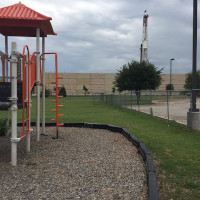
A Texas Town Refuses Fracking Expansion
View the page for this story
The City Council of Arlington, Texas has taken a historic stand by refusing to expand a fracking complex located next to a preschool that serves primarily Black and Latino children. Ranjana Bhandari, founder of the environmental advocacy group Liveable Arlington, joins Host Steve Curwood to talk about the city council's groundbreaking decision. (12:51)
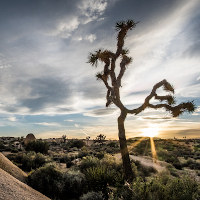
Beyond the Headlines
/ Peter DykstraView the page for this story
In this week's Beyond the Headlines Environmental Health News Editor Peter Dykstra joins Host Steve Curwood to look at how microplastic particles are raining down from the sky, even in National Parks. They also cover the Canadian oil sands industry’s cutting of green initiatives, and good news that wolverines may be expanding through the Cascade Range. Finally, they look back in the history calendar to mark Jim Hansen’s Congressional testimony about the dire consequences of climate change, back in 1988. (05:11)
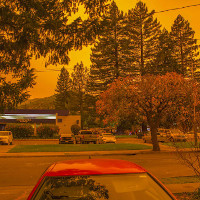
Bill McKibben on the Divestment Movement
View the page for this story
Harvard is one of the latest in a series of wealthy institutions around the world announcing steps towards pulling their investments in the fossil fuel industry. But Harvard’s announcement has been called too little, too late. Bill McKibben, author of “The End of Nature” and cofounder of 350.org, joins Host Steve Curwood to discuss Harvard’s announcement, and what the divestment movement has achieved so far. Also, why racial justice goes hand in hand with the fight for a cleaner environment, and the big takeaways that the coronavirus pandemic has for the climate crisis. (22:39)
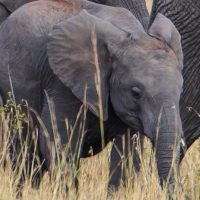
Eye Contact with a Wild Elephant
/ Mark Seth LenderView the page for this story
Eye contact can be powerful, a knowing look exchanged between beings. And for Living on Earth’s Explorer in Residence, Mark Seth Lender, nothing compares to catching the eye of a wild elephant. (04:37)

BirdNote®: Salmonberry Bird
/ Mary McCannView the page for this story
The names of birds and other creatures often give us clues to their behavior, or an insight into their unique personalities. That’s particularly true for names derived from Indigenous groups with long histories of living closely with nature. In this week’s BirdNote® Mary McCann explains how the Salmonberry Bird came by its name. (02:04)
Show Credits and Funders
Show Transcript
HOST: Steve Curwood
GUESTS: Ranjana Bhandar, Bill McKibben
REPORTERS: Peter Dykstra, Mark Seth Lender, Mary McCann
THEME]
CURWOOD: From PRX – this is Living On Earth.
[THEME]
CURWOOD: I’m Steve Curwood.
Racial justice prompts the city council of Arlington, Texas to reject a gas well
expansion.
RANJANA: This drill site is right next door to a preschool that largely serves children of color. 80% of their children are Black, the rest are Latino kids. From the playground, you have a very good view of the drill site.
CURWOOD: Also climate activist Bill McKibben faults Harvard for its pledge to go carbon neutral by 2050, saying that’s too late.
MCKIBBEN: We very much want to take a stand about climate change. I mean, we're in the business of preparing students for the future. It's a wonderful business to be in. But that implies not only that you prepare the students well, but that there's a future for them to exist in.
CURWOOD: Those stories and more this week on Living on Earth – Stick Around!
[NEWSBREAK MUSIC: Boards Of Canada “Zoetrope” from “In A Beautiful Place Out In The Country” (Warp Records 2000)]
A Texas Town Refuses Fracking Expansion
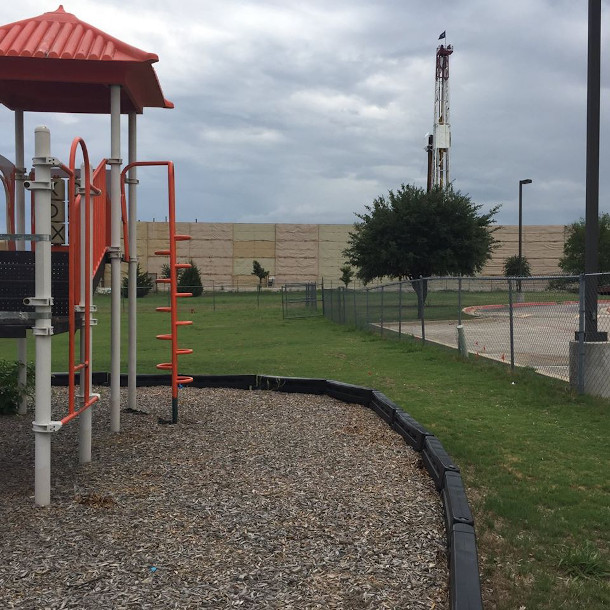
Cornerstone Academy is a preschool in Arlington, Texas, located only a short distance from a Total drilling site. The recent decision from the City Council prevented the expansion of another drillsite that is close to another preschool. (Photo: Courtesy of Tammie Carson)
[THEME]
CURWOOD: From PRX and the Jennifer and Ted Stanley Studios at the University of Massachusetts Boston, this is Living on Earth. I’m Steve Curwood.
With a spotlight now on institutional racism the City Council of Arlington Texas has taken a historic stand by bucking a state law and refusing to expand a gas well complex close to a preschool for black and brown children. There are about 350 natural gas fracking wells and 400,000 people in Arlington, which is located between Dallas and Fort Worth in North Texas. In the past the Arlington city council has disproportionately approved more fracking wells located near neighborhoods of color than in white neighborhoods. But recently environmental justice advocates convinced the council to reject the drilling near the preschool of two more wells by Total Barnett, part of the French oil giant Total S.A. Ranjana Bhandari is an economist and the founder of the environmental advocacy group Liveable Arlington, and she joins us now.
Ranjana, welcome to Living on Earth!
BHANDARI: Thank you, Stephen. Thanks for having me.
CURWOOD: Tell me what's the history of Arlington, Texas with regard to oil and gas drilling?
BHANDARI: Arlington lies on top of a formation called the Barnett Shale. And about 12 years ago, drillers discovered that using horizontal drilling, they could drill under built-up areas with homes and schools and parks. And so drilling arrived here about a dozen years ago, and it was presented to the community as a safe way to produce energy at home. Most people signed on. They were promised high royalties and a very safe process of drilling. None of those promises turned out to be true, and drilling continued to expand and now we have about 350 gas wells, 55 drill sites, and most of these are located very close to our homes and schools.
CURWOOD: What are some of the health effects that come from living around these drilling sites?
BHANDARI: When drilling first arrived, there were no studies done to establish that fracking was safe. And there was very little research about the health effects. Over time that has changed, there are now thousands of peer reviewed studies that point to a multitude of health effects that include respiratory disease, asthma, higher incidence of cardiac disease, more hospitalizations, and poor birth outcomes that include preterm birth and low birth weight. So the evidence has really mounted in the last 12 years that this has been a very dangerous thing for people who live around drilling.
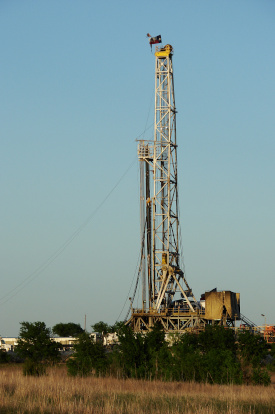
An oil drilling rig in the Barnett Shale in Northeast Texas. (Photo: David R. Tribble, Wikimedia Commons, CC BY-SA 3.0)
CURWOOD: Why is this a matter of environmental justice?
BHANDARI: When this hearing happened, our council was very concerned with issues of racial equity in light of what is happening nationwide in the aftermath of the killing of George Floyd. They started out that council meeting by passing two resolutions on racial equity, expressing their desire to work towards reducing racial disparities. An hour or so later, this was the agenda item that came up. And all these issues were brought up by residents. The fact that the impact of this particular expansion of drilling would disproportionately impact people of color. This drill site is located in the eastern part of Arlington in a zip code that has the highest incidence of COVID-19 at this time in Arlington. It also is in a neighborhood where half the population is African American. And more than 20% of the population is Latino. And they have a poverty rate there of more than 25% and one in three children there live in poverty. This drill site is right next door to a preschool that largely serves children of color. 80% of their children are black, the rest are Latino kids. From the playground, you have a very good view of the drill site and the principal's spoke, and she spoke very powerfully about the impact this would have on her children now, and potentially in the future because they would be exposed. According to a Harvard health study, places that have higher levels of air pollution have experienced higher morbidity from COVID-19. We also know that African Americans are dying at a much higher rate from COVID-19 in our country than the rest of the population. African Americans have a death rate from COVID which is almost three times higher than the death rate for white people. So it is a matter of environmental justice because of the demographics of this neighborhood. And we are going through acute economic distress, so people don't have access to health care, people are struggling financially. And one of the things we discovered in talking to neighbors was that there's a fairly high incidence of childhood asthma. Asthma is a very expensive disease. The studies have established that it costs about $3,200 a year to manage asthma. So that is a very high burden to place economically on people, especially at this point in time.
CURWOOD: By the way, I've heard that there's a law in Texas, about fracking bans. What is this law?
BHANDARI: There's a law called HB 40 that was passed five years ago by the state legislature in response to the city of Denton banning fracking within its city limits. At that time, industry and our politicians colluded to pass this bill called HB 40, which essentially, was supposed to be a ban on fracking bans. But it went much further. It basically said that no city in Texas had the right to regulate drilling anymore. And as long as drilling was deemed to be commercially reasonable, it would be allowed, even if a city determined that it was harmful to its residents.
CURWOOD: So, where does Arlington's battle with the oil and gas companies go from here?
BHANDARI: You know, that is a very good question. My first hope is that given the particular facts of this case, industry will just stand down. Total, which is a large global energy conglomerate based in France, a country that has banned hydraulic fracturing within its limits because they think it is unsafe for their citizens, is the company that wants to drill here. They have 38 drill sites in our city. They have a few hundred wells here. And I think that they are showing that they are a particularly bad neighbor in this case, because they're showing such disregard for the affected neighborhood. So, I'm hoping that seeing the facts of the case as was presented to them, facts that they should have gathered before they came up for a vote, they will just stand down. That is what good corporate citizenship would require. If they don't, this will be a first in Texas since that bill was passed where a city did something to protect its residents that might actually clash with HB 40. So we're all waiting to find out what happens.
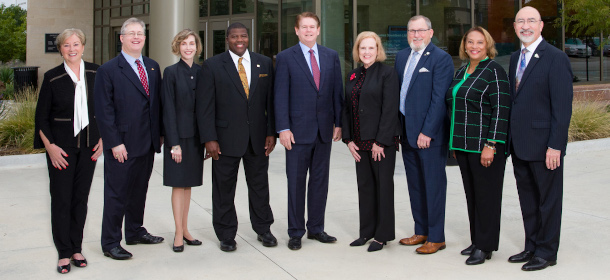
Six of the nine members of the Arlington City Council voted to reject the plans for expanding the Arlington gas well site. (Photo: Courtesy of Arlington City Council)
CURWOOD: What does this victory say about the power of local organizing, Ranjana?
BHANDARI: I think it says a lot about the power of local organizing. We worked really hard. We built a very diverse, multiracial coalition. We talked to more than 1,000 people in the neighborhood. We worked with the social justice committee at a very large Catholic Church nearby. We worked with immigrants rights advocates, and of course, the preschool and the affected parents there. I think if we all work together, and speak up in one voice and point to the pertinent issues, which is the harm being done to people, and particularly in this case, children and children of color. I think that argument made in this way, moves our leadership. Our leadership has been very pro-drilling for the entire period the fracking has been happening here. The city has made more than $100 million, I think approximately $150 million in royalties from fracking. But I think this win shows that even a city that has benefited to such a large degree from fracking is concerned about how it's affecting our children. And so I think this is a very important win. It shows the power of organizing, it shows the power of organizing outside of traditional environmental groups. It shows the power of organizing that truly centers impacted communities and makes them the voice of the harm being done.
CURWOOD: Ranjana, you were trained as an economist, what's your perspective from that discipline about what's happening with fracking there in Arlington, and indeed on the planet at this point?
BHANDARI: So fracking was presented to this community and I'm sure other communities as a costless way for people to make money while helping America become independent in its energy needs. That was what we were told. And then there was a lot that was missing. Fracking happened because the 2005 Energy Act exempted from some of our major federal environmental laws, like the Safe Drinking Water Act. And what has happened in the 12 to 15 years since fracking started, is that the economic benefits from fracking have been privatized. But the cost of fracking has been spread across hundreds of towns and communities like ours. It has led to air pollution, higher medical costs, it has led to tainting of our water supplies, and none of those costs are measured by the market or factored into the price of cheap natural gas that fracking has produced. All of those costs impact local communities. So the benefits have been private, the costs have been socialized. And then of course, there's the much bigger costs; the climate crisis that is already here and that is going to impact our children very, very seriously. The economic cost of the climate crisis is measured at trillions and trillions of dollars in economic disruption, the cost of mitigation, and the health costs, and all of that will fall on our children. So the market is not really qualified to make a judgement about the benefits here because the market does not take into account any of the costs of fracking.
Ranjana Bhandari is the founder of Liveable Arlington and a Public Voices Fellow with The OpEd Project. (Photo: Courtesy of Ranjana Bhandari)
CURWOOD: Those are some pretty difficult numbers, Ranjana.
BHANDARI: I think in places like Texas, where the fossil fuel industry is very important and very closely linked to our political system and our elected leaders, there is no motivation to outline these costs, but they're very easy to measure. For instance, I told you earlier, asthma, which is linked to air pollution and some of that air pollution is coming from all the drilling that is happening here in the Barnett Shale, costs upwards of $3,200 a year per person. Tarrant County, where I live, has the highest rate of childhood asthma in the country. 19% of our children have asthma. So when we look at the cost, that $150 million disappears very quickly.
CURWOOD: Ranjana Bhandari is the founder of the children's environmental advocacy group, Liveable Arlington. Thanks so much for taking this time with us today.
BHANDARI: Thank you, Stephen. Thanks for having me.
CURWOOD: Efforts to reach Total and its Texas affiliate by telephone and email for comment on this story were unsuccessful by the time we went to went to broadcast.
Related links:
- Fort Worth Star-Telegram | “No New Gas Wells in East Arlington Neighborhood for Now, City Council Decides”
- The Liveable Arlington Website
- Read the Compendium of Scientific, Medical and Media Findings Demonstrating Risks and Harms of Fracking
[MUSIC: Haugaard & Hoirup, “Huset ved havet/Vals fra Agerkrog” on “Rejsedage (Traveling),” GO'Danish Folk Music]
CURWOOD: Coming up – We’ll take our weekly trip beyond the headlines with Peter Dykstra. That’s just ahead on Living on Earth.
ANNOUNCER: Support for Living on Earth comes from Sailors for the Sea and Oceana. Helping boaters race clean, sail green and protect the seas they love. More information at sailors for the sea dot org.
[CUTAWAY MUSIC: Yank Lawson and Bob Haggart, “The Yellow Rose of Texas,” traditional American, on The World’s Greatest Jazz Band, Everest Records]
Beyond the Headlines
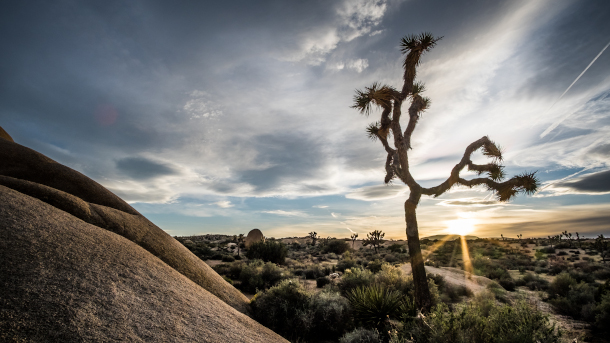
A new study has found that some natural areas in the United States are seeing more than 1,000 metric tons of microplastic rain. The study included National Parks in the Western part of the United States like Joshua Tree National Park, pictured above. (Photo: Guiseppe Milo, Flickr, CC By 2.0)
CURWOOD: It's living on Earth. I'm Steve Curwood.
And it's time to take a look beyond the headlines with Peter Dykstra. Peters down there in Atlanta, where he mostly works for Environmental Health News, that's ehn.org and daily climate.org, but sometimes he tells us some things that he's seeing out there. Hey, Peter, what's going on?
DYKSTRA: Hi, Steve. The key number for this week is 11 billion metric tons. That's how much plastic is expected to accumulate in the environment by the year 2025. According to some new research published in Science Magazine.
CURWOOD: Whoa, that's a that's a lot of plastic Peter.
DYKSTRA: Yeah, much of that plastic ends up as a pollutant not just in the oceans and in waterways, but plastic is literally falling from the sky. A very striking new term new to me anyway, is plastic, rain. Microplastic particles that end up in the sky, they fall everywhere. One study looked at micro plastic particles just in American National Parks and protected areas. A thousand metric tons a year of microplastics are estimated to fall in our national parks.
CURWOOD: Hmm. Well, sometimes people leave plastic bottles behind in the national parks. How does that compare though to all the microplastics?
DYKSTRA: Well, we're doing a lousy job leaving plastic trash behind, including bottles. But if you add up those thousand metric tons of micro plastics, it would be equivalent to 300 million plastic bottles.
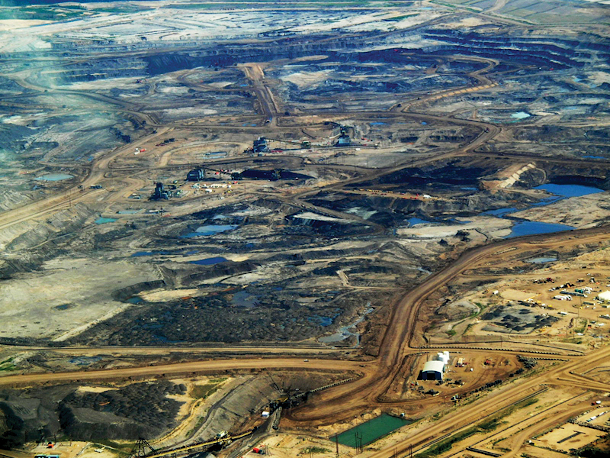
The tar sands in Alberta Canada can be extremely destructive for both the climate and surrounding environment. (Photo: Dru Oja Jay, Flickr, CC by 2.0)
CURWOOD: Oh my. Hey, what else do you have for us?
DYKSTRA: We’ll go up to Canada and the tar sands region in the province of Alberta. Tar sands were once the hope for Canada becoming a major economic power through fossil fuels. The fact that tar sands are dirty, make them more controversial. The potential for spills from some of the pipelines like Keystone XL, make them even more controversial. People have been moving away from investment in tar sands and the Canadian oil sands or tar sands companies have decided to make up some of their loss revenue by killing out two billion dollars Canadian in green initiatives.
CURWOOD: So wait, you're saying that the $2 billion that they pledged to spend to clean up their emissions and lessen their governmental impact is gone?
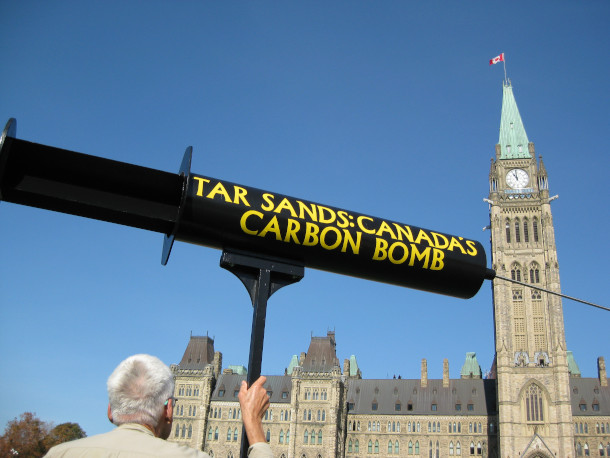
Alberta, the center of tar sands oil production, has temporarily reduced environmental monitoring after the coronavirus pandemic. (Photo: Peter Blanchard, Ottawa Action, Flickr, CC By 2.0)
DYKSTRA: Right. So they were taking so much heat about how dirty a fuel source this is that they featured some big green initiatives. And when the going got rough, the green initiatives were the first thing to go. Which make tar sands a dirty prospect once more in an economy that seems to be on the verge of failing for fossil fuels.
CURWOOD: Hmm. Hey, Peter, what else do you have for us today?
DYKSTRA: Well, one of my favorite charismatic megafauna is the wolverine. It's not charismatic in the sense that it likes to see people it can be pretty fierce. They're known to be pretty reclusive. There's only one population of Wolverines in the United States in the northern Cascades mountains in Washington State. Researchers recently found evidence of at least one den of wolverines in the southern Cascades suggesting that they may be expanding. There are no wolverine populations, anywhere, at least in the lower 48 that are known. And one place where you're never going to find a four legged Wolverine is in the state of Michigan, where the Wolverines, of course, are the mascot for the University of Michigan. Hail to the victors.

Wolverines can be easily mistaken for small bears, but they are actually the largest members of the weasel family. (Photo: Barney Moss, Flickr, CC By 2.0)
CURWOOD: All right, Peter. Well, hey, it's that time when we get together that I asked you to look back at history for me, what do you see today?
DYKSTRA: Here's an anniversary that means a lot June 23, 1988. A NASA scientist named Jim Hansen testified before Congress. Senator Al Gore, Senator Tim Wirth brought forth most of the questions and Hansen, in that one day delivered testimony that for the first time for many Americans was a loud warning about what problems we're getting into with climate change.
CURWOOD: Oh, yeah, that was perhaps the hottest day of June of 1988. It was over 100 degrees in Washington, DC.
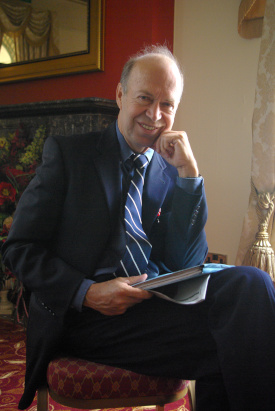
On June 23rd, 1988, James Hansen warned the United States Congress of the potentially disastrous consequences of climate change. (Photo: Flickr, Flickr, CC by 2.0)
DYKSTRA: Yeah. The weather not the climate served as kind of a prop. There have, of course been other climate hearings when they got an unusually large snowstorm in the middle of winter. The standard reminder is that you don't take any days weather or weather event and presume anything about climate change in the long run. But what Hansen told us and still tells us 32 years later, is that we're in for a really hard time. Everything he said back then just about has been validated and proven and replicated in science. On the politics side. We've done very little to actually address it.
CURWOOD: Alright, thanks Peter. Peter Dykstra is an editor with environmental health news as ehn.org and daily climate.org. We will talk to you again real soon.
DYKSTRA: All right, Steve, thanks a lot. Talk to you soon.
CURWOOD: And there's more on these stories at the living on earth website loe.org.
Related links:
- Read about plastic rain in protected areas of the United States
- Reuters | “Canada’s Oil Patch Cuts Down Climate Efforts Under Pandemic”
- Columbia Insight | “Wolverines Break Through...Finally!”
- Grist | “Look Back at James Hansen’s Seminal Testimony on Climate, Part One”
[MUSIC: The Letterstick Band, “Yi-Rana,” by David Maxwell Diyana and Terence Wilson on Dreamland, Putumayo World Music]
Bill McKibben on the Divestment Movement
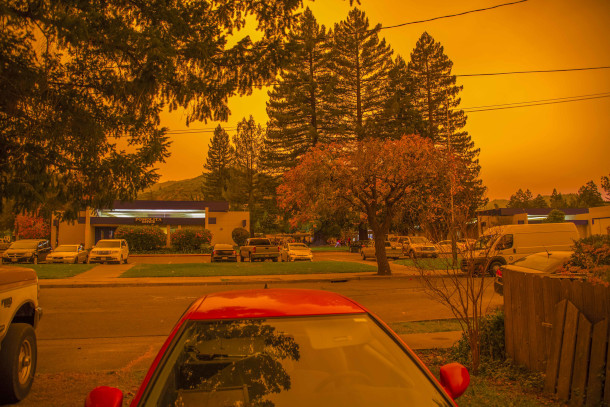
Smoke from the Camp wildfire in Ukiah, California. (Photo: Bob Dass, Flickr, CC BY 2.0)
CURWOOD: When the establishment is slow to move on a social issue of fairness, campaigners sometimes advocate for the divestment of holdings in companies that they perceive as part of the problem. For years campaigners opposed to the apartheid regime of South Africa urged university and foundation endowments and other institutional investors to sell their stock in companies that did business with the white supremacist regime. And just as the pressure from the anti-apartheid divestment movement helped efforts to desegregate South Africa, nearly a decade of calls for the divestment of fossil fuel stocks to help address climate disruption seems to be having an effect as well. Many pension funds as well as university and college endowments have signed on. Some universities including Cornell and Georgetown have committed to full divestment within the next ten years, while others including Brown and the University of California system, have already pulled nearly all of their investments from fossil fuels. Now, Harvard University says it will take steps to join the divestment movement and be carbon neutral by 2050 as UN scientists have urged but critics say if Harvard waits until then to reduce its fossil fuel investments it’ll be far too late for the climate. Writer Bill McKibben is the award-winning author of the End of Nature and a co-founder of 350.org, and perhaps the most prominent leader in the fossil fuel divestment movement and he joins me now. Bill, welcome back to Living on Earth!
MCKIBBEN: Hello, Steve,
CURWOOD: Boy, how many years ago you wrote The End of Nature, 1989?
MCKIBBEN: That would be 31 years ago, Steve.
CURWOOD: Congratulations! And then fast forward to the moment where you start 350.org with some students from Middlebury College. How did this all come together?
MCKIBBEN: Well, you know, I spent those years after writing The End of Nature, writing more books and talking all the time about climate, thinking that we were engaged in an argument. It took me way too long to figure out that, really, we'd won the argument. We were just losing the fight because the fight wasn't about data and reason, it was what fights are always about: money and power. And once I figured that out, we were going to have to take on the fossil fuel industry. We started trying to build movements because, you know, historically, that's the only way to stand up to money and power on that scale. That 350 is was the kind of first iteration of the global climate movement. And now thank god we've got Extinction Rebellion and Sunrise Movement and climate striking kids all over the world and on and on and on.
CURWOOD: How do you feel about all that Bill?
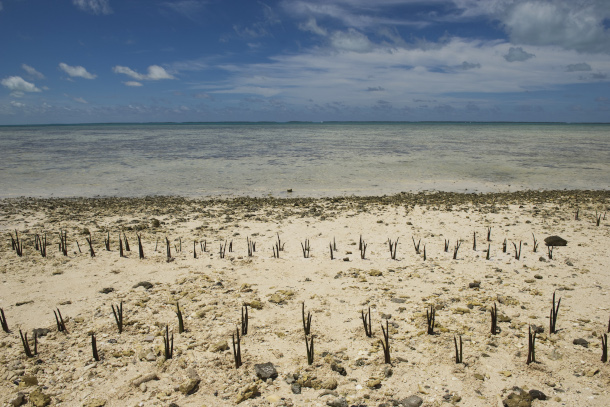
Mangrove shoots planted on an atoll in Kiribati as part of a UN campaign to raise awareness about the effects of climate change on the land. (Photo: United Nations Photo, Flickr, CC BY-NC-ND 2.0)
MCKIBBEN: When I need to make myself feel optimistic about the world, that's what makes me feel optimistic. Of course, it's all taken a long time to get going. And in the process, the planet is heated up a lot. And we've begun to see real trauma. What were warnings 31 years ago and The End of Nature are now kind of bulletins from the front line as we watch Australia half burned to the ground or storms like we've never seen before crash into our coasts. So I don't know whether we got started in time or not, but I know that there's now a really powerful fight underway and we're taking some bites out of the fossil fuel industry.
CURWOOD: So let's go back to what, 2012 is when 350.org really launches Go Fossil Free?
MCKIBBEN: Yeah, I mean, at the time when it started, it was very small affair. I mean, I can remember the day that the very first institution, a college in rural Maine called Unity College with an endowment of $8 million announced that it was divesting from fossil fuel and we were over the moon. We didn't know that it would grow into $14 trillion worth of endowments and portfolios that have divested in part or in whole, or that it would reach the point where as that stock guy, Jim Cramer said on TV in January, no one should invest in Big Oil anymore. Divestment campaigns just gotten too big. You can't make money anymore out of oil.
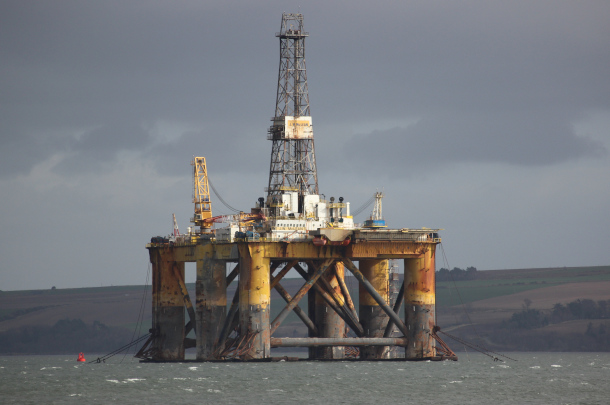
An oil rig off the coast of Scotland. (Steven Straiton, Flickr, CC BY 2.0)
CURWOOD: Should I say congratulations?
MCKIBBEN: Well, I gotta say, that made me happy to hear. Because really, it's been the political power of the fossil fuel industry that's kept us locked into our current status quo. Their business model literally depends on us not taking climate change seriously. And for years, really, for decades, they got away with it. They knew everything there was to know about climate change back in the 1980s and just straight up lied about it. That disinformation campaign has cost us what may turn out to be the crucial 30 years, but at least now, people are managing to fight back.
CURWOOD: So what do you think enabled the fossil fuel divestment movement to grow despite the uphill battle that it's faced?
MCKIBBEN: Well, I think there were a couple of things. One was that the kind of math around this became very clear. The divestment movement launched with an analysis, some data showing that the fossil fuel industry had five times as much carbon in its reserves as any scientists thought we could safely burn. And once we had that data in hand, really everybody could see that if the fossil fuel industry's business plan carried out as they wanted it to, there was no drama, no mystery to this story, the final chapter was writ. I think the other thing though, and maybe most important, was that it let everybody get in the fight. Now, most people don't have a pipeline going through their backyard and they don't live next to a coal mine. But everybody is in proximity to a pile of money someplace, a university endowment to city pension fund, a church retirement fund, and those were precisely where people mobilized. You know, as I say, it started one small college in Maine, but by last year, we were, you know, the University of California system divesting 126 billion dollar-pension and endowment fund or the Republic of Ireland divesting all its public accounts or the city of New York divesting its $200 billion pension fund. So not only has it been a question of money, it's also been a question of many of the most important institutions on earth being forced by activists to break ties with this industry, to say we no longer want to participate with an industry that's wrecking the planet.
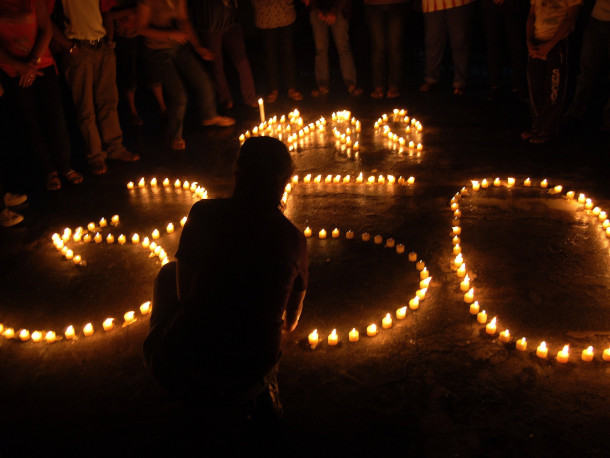
‘350’ stands for 350ppm of carbon dioxide, the safe upper limit to avoid a climate tipping point. (Photo: Shubert Ciencia, Flickr, CC BY 2.0)
CURWOOD: Of course, one of those activists is Bill McKibben, you. And as I recall, it's about 2012 you start this tour of college campuses that you labeled do the math. But in fact, who really led this movement of fossil fuel divestment?
MCKIBBEN: Well, an awful lot of it was young people. That's who's been at the forefront of the climate movement all along. And there they were in college, a lot of them working hard on fossil fuel divestment. And really, Steve, one of the best outcomes of this whole thing is that those exact same people when they graduated from college and wanted to keep working, went on to found the sunrise movement, and they're the ones who brought us the Green New Deal. So for instance, Varshini Prakash, who is the executive director of the Sunrise Movement, and really the lead spokesman, I think for the Green New Deal, she was the same young woman who divested University of Massachusetts during her undergraduate years. So one of its many uses was as a terrific training ground for some of the best activists in the country.
CURWOOD: Now, Bill, tell us what exactly does divestment look like? What exactly does a university or a pension fund or a foundation need to do to cleanse itself from investments in the fossil fuel industry?
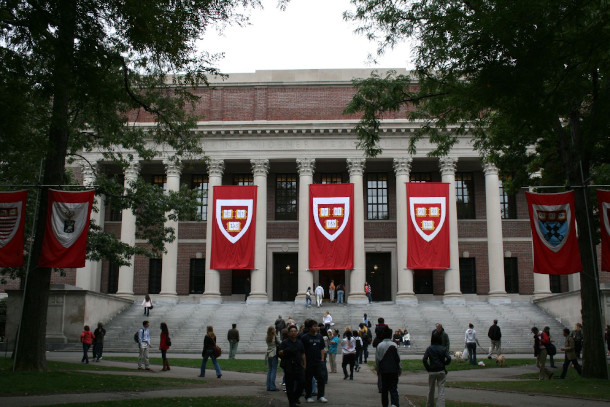
The Widener Library at Harvard University. (Photo: Joseph Williams, Wikipedia CC BY 2.0)
MCKIBBEN: Well, you know, at first it was a little bit hard for places to do it because investment advisors and tanks didn't know how to do it. They said, oh, it's impossible. We're all our funds are mingled, you're in index funds, it's so hard to get out. But relatively quickly, all kinds of funds sprung up that made it easy for people to get out of fossil fuel. So really, I mean, all it takes is your investment advisors making a committed decision to sell those stocks over the course of a few years. And one of the things that made it much easier was that, pretty soon, there was not only a strong moral case, there was also a strong financial case. The institutions that divested from fossil fuel really did well financially, because the fossil fuel industry has been the worst performing part of our economy. And for good reason. I mean, A, their product is destroying the planet. So that attracts regulatory pressure and, B, the sun and win, people have figured out how to provide the same service, energy, just cleaner and cheaper. So it's a terrible business to be in. Even if you didn't care about destroying the planet, you'd want to get out of it because it just loses money.
CURWOOD: So how has the divestment movement played out for the fossil fuel industry?
MCKIBBEN: Well, they've hated it from the beginning. And it turns out, it wasn't just what we kind of thought at the start that we were taking away their social license. That's been very effective. There's nothing that's been more effective in spreading the news that their business model equals disaster for the Earth. But it has reached a size and scale where it's begun to cause them real financial problems. I told you before that Jim Cramer had said on his, you know, stock picking program, that this was the reason that big oil was no longer a good investment. Shell said in their annual report last year, that it did become a material risk to their business, which is good since Shell's business is a material risk to the planet. I mean, when the coal industry went begging to Congress for a bailout at the beginning of the COVID crisis, they listed divestment as one of the reasons they couldn't raise money on their own.
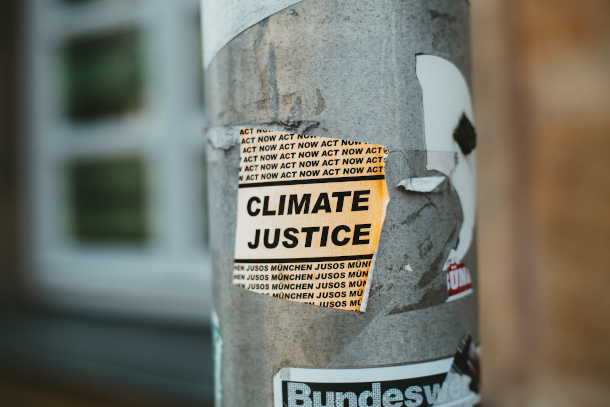
A sticker as part of a campaign for action on climate justice. (Photo: Markus Spiske, Flickr, CC BY 2.0)
CURWOOD: How interesting did you find it during these discussions in universities that that economic argument that these endowments were at risk because of what was happening with fossil fuels for many years seem to fall on deaf ears?
MCKIBBEN: Well, here's the interesting thing about universities in particular. You know, their boards of trustees, I think if you go back 40 or 50 years, they were mostly made up of kind of eminent people with the occasional rich guy there, you know, in order to write some checks. But now they're mostly made up of just rich people. And if you look at where the money is in our strange twisted economy, that mostly means people out of Wall Street. So it was hard for them to deal with the fact that people were calling to account the notion that investment could be a real force for evil on this planet. And it took them a while to wrap their heads around that, in fact, it took their students shouting at them over and over and over again before it finally began to get through. And it hasn't gotten through everywhere. I mean, there are universities and Harvard's probably the best example that just obstinately refused to do this. I think basically, because they're worried that some ancient old alum sitting in his overstuffed leather chair is going to read a nasty article about it. In the Wall Street Journal and, you know, give one less squash court in his will or something.
CURWOOD: Why is Harvard's recent carbon neutrality by 2050 announcement controversy for for many activists? And how do you personally feel about their decision? And of course, I should mention that in full disclosure, it's kind of personal for both of us as we spent our undergrad years there.
MCKIBBEN: I don't think that Harvard's announcement's controversial for activists, I don't know anybody who's anything but disgusted by it. I mean, look, Harvard has long since forfeited the idea that they're going to be a leader on any of this stuff. And now they're not even willing to be a follower. Announcing that you're going to do something in 2050 at this point, Steve, you know, the science of all of this well enough to know that's not very helpful. The game will be decided long before then we need people stepping up and acting now. And I gotta say Harvard has been a tremendous disappointment, but whatever. The rest of the world is going on around them. The other Ivy's are, many of them, busily divesting the biggest universities on the planet are divesting like the UC system. And the same day that Harvard made its announcement that it was going to wait till 2050, the only institution with more prestige and status, Oxford, said we're all in with fossil fuel divestment. So I'll take that.
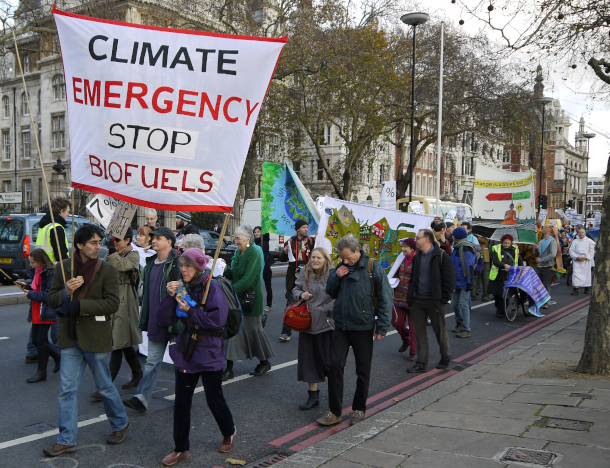
A climate justice march. (Photo: Global Justice Now, Flickr, CC BY 2.0)
CURWOOD: My guest is Bill McKibben and we’ll have more of our conversation just ahead on Living on Earth.
ANNOUNCER: Funding for Living on Earth comes from you, our listeners, and United Technologies, combining passion for science with engineering to create solutions designed for sustainability in aerospace, building industries, and food refrigeration.
[CUTAWAY MUSIC: Haugaard & Hoirup, “Huset ved havet/Vals fra Agerkrog” on “Rejsedage (Traveling),” GO'Danish Folk Music]
CURWOOD: It’s Living on Earth, I’m Steve Curwood.
And I’m back now with writer, climate activist, and co-founder of 350 dot org, Bill McKibben.
So what are the rationales that universities have given for their decisions once they do decide to divest from fossil fuels?
MCKIBBEN: Well, once they make the decision, they've been able to join with students and saying, we very much want to take a stand about climate change. I mean, we're in the business of preparing students for the future. That's a wonderful business to be in. But that implies not only that you prepare the students well, but that there's a future for them to exist in. And it doesn't make sense to be training people to go off and do a thousand interesting, wonderful careers, and at the same time, building a world where all those students are going to be doing in 40 years is some kind of, you know, emergency response because that's all we're going to be doing as a society. So I think it's really liberating for institutions to say, you know what, we're on the same side, as our students on this. And we've understood that they have moral authority here, because they're going to be dealing with this long after we trustees are in the grave.
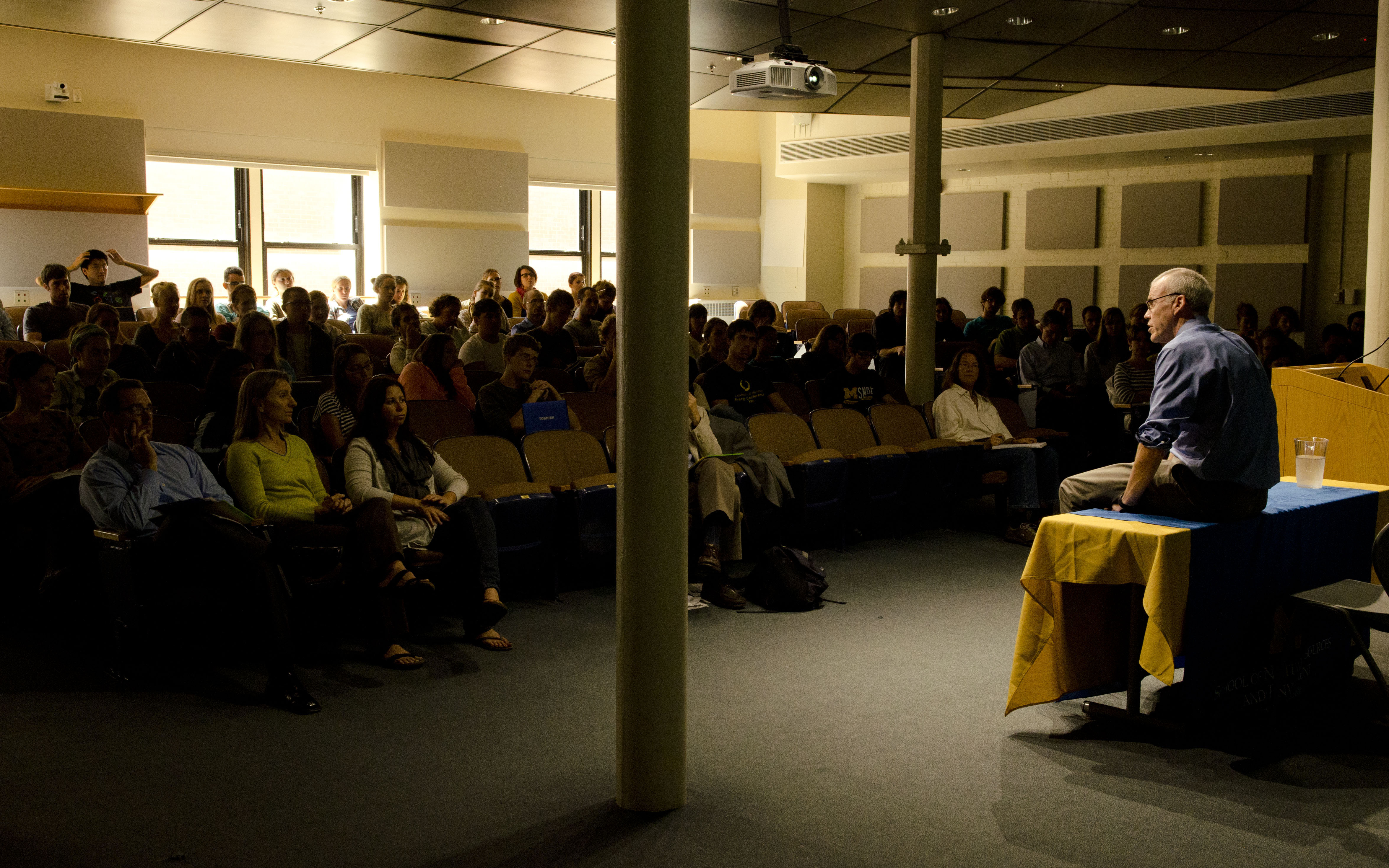
Bill McKibben giving a speech at the School for Environment and Sustainability at the University of Michigan. (Photo: Dave Brenner, SNRE, Flickr, CC BY 2.0)
CURWOOD: Let's just go back to Harvard for a moment on that point. Not only students, but faculty at Harvard, say, looking at sea level rise, some of the Harvard campus could be underwater, not so long from now.
MCKIBBEN: Yep. And this is one of the things of course, that makes it so galling that these institutions, some of them continue to invest in fossil fuel. It's in the research labs of these universities that we found out about climate change. That's how we know what's going on. And so it's just crazy making that they refuse to take that seriously.
CURWOOD: So what's next for the fossil fuel divestment movement? Do you think?
MCKIBBEN: Well, what's happening is that not only is it continuing to grow in this sort of selling stock from the fossil fuel industry, but it's kind of morphed in the last year or two into a big assault on the financial institutions--banks, asset managers, insurance companies that are their financial lifeline. We're calling this Stop the Money Pipeline. That's a big coalition of environmental groups from the Sierra Club and 350 to you know, many, many, many groups. A lot of this work pioneered by indigenous groups, especially in the wake of the Dakota Access Pipeline fight. And you know, it's still early days in a way, but it's been successful much more rapidly even than the divestment work, because it builds on it. You know, in the course of the winter, BlackRock, the biggest asset manager on Earth, really the biggest box of money on planet Earth, their CEO, after a big pressure campaign, came out and said, this is going to be the issue that drives all our financial thinking going forward. And indeed, in this spring's shareholder season, BlackRock at least began to take some votes to force companies of which they own large percentages to start wising up about climate. So this is the next part of that work.
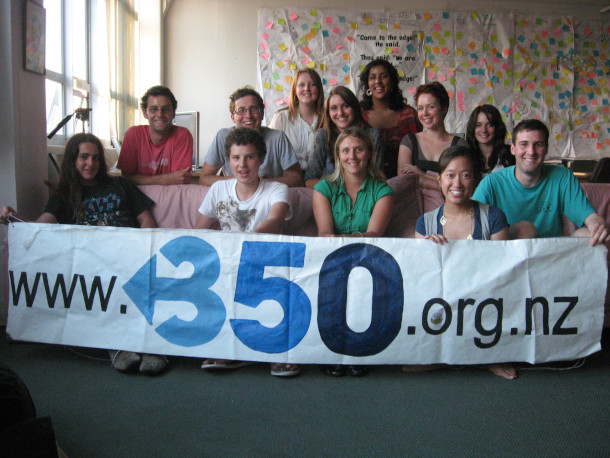
Activists hold a banner for 350.org. (Photo: 350 Aotearoa, Flickr, CC BY 2.0)
CURWOOD: What kind of criticism have you endured over the years for your climate activism?
MCKIBBEN: Oh, just as one would expect when one's taking on the most powerful forces in the world, that they're not going to like it. So there have been plenty of people who've gone after me in one way or another. But those kind of things come and go. What endures is the incredibly stark fight that we're in. What endures is the constantly rising level of CO2 in the atmosphere. And thank God, the constantly rising level of activism designed to turn that around. It's become, by some measures, maybe the most widespread fight around the world. And I think we're reaching a turning point. I think that the political power of the fossil fuel industry has begun to wane after a century or two of waxing. And our job is to accelerate that to push hard for really rapid, rapid change.
CURWOOD: Bill, you know back even in 2016, you were closely involved with Bernie Sanders' campaign for president. With your wisdom and perspective, looking ahead at this electoral season, what do you see? What should be done?
MCKIBBEN: I don't think there's ever been a clearer election than we've ever faced now. And that's not because, you know, Joe Biden is the single greatest champion of all good things that there ever was. He's not, but it's because it should be clear to any thinking human being that we simply cannot stand another four years of Donald Trump, not on a thousand different counts, but climate's one of the most obvious. I mean, look, this guy pulled the country that put more carbon into the atmosphere than any other out of the only international effort, the Paris Climate Accords, to do anything about it. He's done a lot of shameful things in his presidency, but that's pretty near the top of the list. So I can't imagine how important it is that we get things done between now and November. And then after November 3, I mean, the good thing about electing half-decent people to run things is then you can go and put pressure on them to do the right thing. I mean, that's what we did with Barack Obama around the Keystone pipeline. It doesn't do any good to go try and pressure Donald Trump. What does he care?
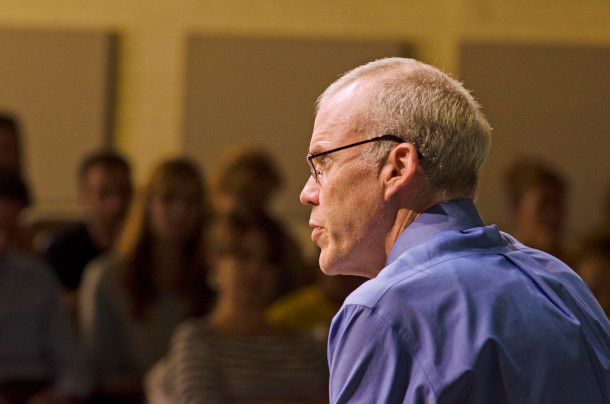
Bill McKibben is an American environmentalist, author, and journalist. (Photo: Dave Brenner, SNRE, Flickr, CC BY 2.0)
CURWOOD: How do you see the issues of climate action and divestment from fossil fuels relating to this present moment of reckoning with systemic racism and police brutality?
MCKIBBEN: Well, I think that the links are tight and close and important. How did this start Steve, it started with a cop kneeling on a guy's neck and him saying I can't breathe. But it's not the only reason that people and our poorest and most vulnerable communities can't breathe. It's exactly the same communities that deal with police brutality all the time that also are most likely to have a coal-fired power plant and the air filled with particulates. It's no accident that African Americans have an asthma rate three times that of the general population. And truthfully, this plays out all over the world. I mean, I can't breathe means lots of things. In Delhi, It means that two and a half million of the 5 million children in that city have irreversible lung damage simply from breathing the air every day because it's so polluted. So these fights are very closely linked. And it's extremely important. I think that environmentalists understand that and play a role, and best they can, in backing up Black Lives Matter and the other people who are at the forefront of this battle.
CURWOOD: Bill, what lessons do you think the COVID-19 pandemic has for us in terms of understanding the kind of worldwide situation we're headed for with climate disruption?
MCKIBBEN: If you ask me, I'd say you probably could take a couple of lessons from the coronavirus crisis. It feels to me like a kind of crisis within a crisis and in certain ways, a kind of harbinger of what we can expect as the climate catastrophe grows. First thing I'd say is it's a good reminder that reality is real. You know, we live in a world where we all sit behind screens, and we can edit and shape and shift things. And so sometimes we forget, but I've been trying to explain to people for 30 years that you actually can't make physics and chemistry compromise or negotiate. The microbe is telling us the same thing about biology. It doesn't matter if our president fulminates from the Rose Garden about how it's all going to go away by Easter or cases will drop to zero, whatever. If the microbe says wear a mask wear a mask, you know. Second thing, speed really matters. You know the countries that addressed coronavirus forthrightly. They got through it with less disruption to life and economy and way, way, way smaller pile of dead bodies than those like ours that delayed and dithered. The analogy to climate couldn't be much clearer. You know, in the same way that the US wasted February during the coronavirus crisis, we've wasted the last three decades. It means we have to move with incredible speed now. And even as we do, we started too late to avoid real trauma. And I think the third thing, probably the most important thing is, you know, social solidarity really matters. Steve, you and I, we grew up in the political shadow of Ronald Reagan, and of the idea that markets were going to solve every problem we faced and so on and so forth. What was his his famous laugh line in all his speeches, you know, the nine scariest words in the English language are, "I'm from the government and I'm here to help."
CURWOOD: Indeed.
MCKIBBEN: You know, "ha ha ha", it turns out the scariest words in English language are "we ran out of ventilators," you know, or maybe "the hillside behind your house has caught on fire." And these are not things that you're going to solve by making yourself rich. These are things we solve together or not at all. And so I hope that we come out of the coronavirus crisis and out of this way-overdue uprising around racial justice with a reminder, with a refreshed understanding, that we're either going to work together to solve our problems or we're not going to solve them.
CURWOOD: Bill McKibben is a writer, activist and co-founder of the climate advocacy group 350.org. As always Bill, thanks so much.
MCKIBBEN: What a pleasure to get to talk with you as always.
Related links:
- Harvard Crimson | “Divest Harvard Calls University’s Carbon-Neutral Endowment Commitment 'Insufficient'”
- The New Yorker | “The Divestment Movement to Combat Climate Change Is All Grown Up”
- PBS News | “This Environmental Justice Activist Breaks Down Deep Ties Between Racism and Climate Change”
- Bill McKibben writes The New Yorker's "Climate Crisis" newsletter
[MUSIC: Ikebe Shakedown, “She’s Knocking” on The Way Home, by Mike Buckley/Vince Chiarito, Colemine Records]
Eye Contact with a Wild Elephant

The herd sticks together. (Photo: © Mark Seth Lender)
CURWOOD: Eye contact can be powerful, a knowing look exchanged between people. But for Living on Earth’s Explorer in Residence, Mark Seth Lender, there is nothing like catching the eye of an elephant.
Eye Contact
African Elephant
Hwange National Park
© 2020 Mark Seth Lender
All Rights Reserved
They mill about. If they were thirsty there is water nearby and plenty of it and they would go there. If they wanted food they would look for it and find it. They are in each other’s company, nothing more. It makes them whom and what they are.
Purpose enough.
Now a dark shape sudden and close: Tusks thick as posts, the wide brow, the ears outstretched, huge! The startled look, as if he did not expect me there, as if he turned a blind corner and was surprised, though I am in plain site. He stares. Unsure. An attitude they all share. And would prefer if the vehicle and the people riding on its open frame were at a distance.
Instead of in the midst.
Of wild elephants.
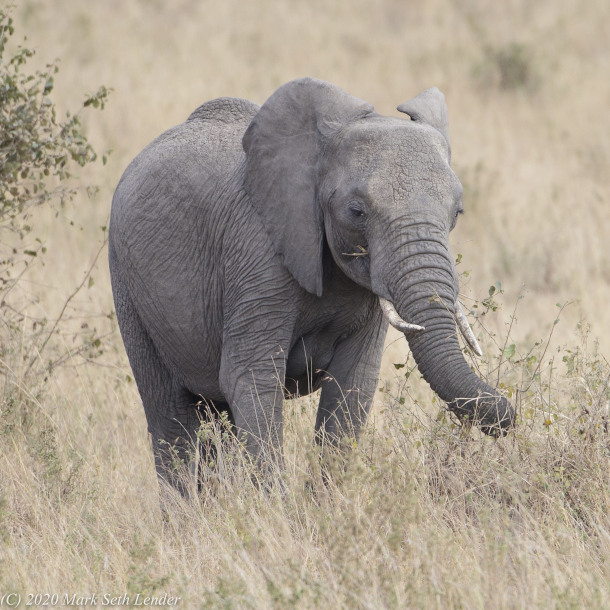
The young female elephant. (Photo: © Mark Seth Lender)
Under the midday sun.
In the total absence of shade…
The bull that was so close veers off and into the herd. I sit and watch the elephants.
On the periphery, at the other side of the clearing where the brush swallows the land, a young female is staring at me. She is twelve maybe thirteen, an age which means in her what it means in us. Her knowledge incomplete. The years of her majority distant. An age for discovery. Naïve, both to possibility and danger.
Every time I glance in her direction she is there looking at me. Me, in particular. So I lift my chin. Twice. Two quick gestures, deliberately as close as possible to imperceptible.
She sees - she was waiting for this - and returns that very same gesture.
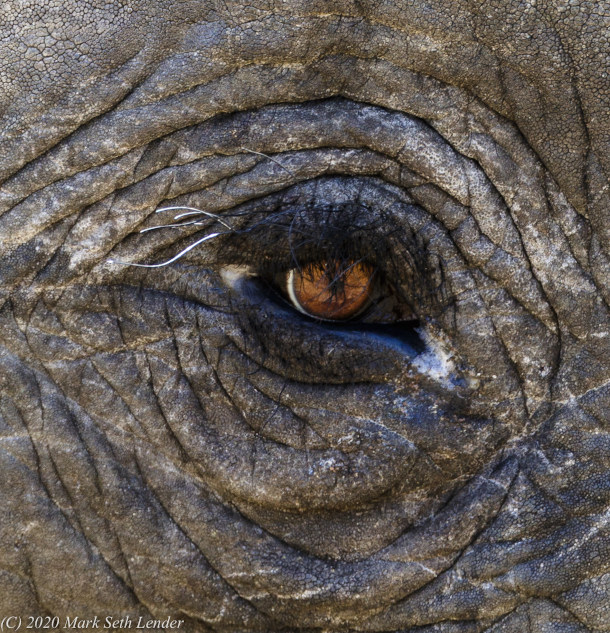
Eye contact with a wild elephant. (Photo: © Mark Seth Lender)
And comes, towards me.
The herd is in motion. Revealing, concealing the line of sight. I see her then I don’t. She sees me then she doesn’t. I am there, then I am not but every time I loose sight of her sure that she changed her mind I see her again; we exchange the sign:
The nod, the softness around the eyes....
Again… Again…
We seek and find each other’s faces.
A reinforcement.
Of Recognition.
Consensus.
Consent.
On through the crowd, the mass of legs, expanses of skin thick and grey and furrowed as drought baked mud; until there is nothing and no one between us.
She raises her trunk.
I lift my hand.
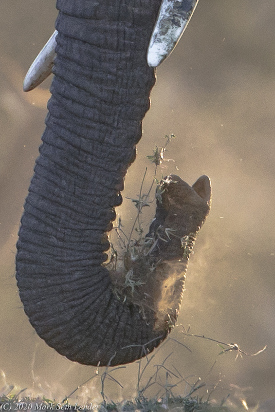
“She raises her trunk. I lift my hand.” (Photo: © Mark Seth Lender)
She reaches out to me as I reach out to her -
And my guide slams his heavy fist on the hood and yells WHADDAYAH THINK YOU’RE DOIN’? GET OUTTA HERE!
I stood, I called to her out loud, Wait! It wasn’t me!
Too late… Too late.
Elephant, for the rest of her long life will think about this. As the day ends if she still lives she is thinking of it now. And as for me, I see that look on her face.
It haunts me.
This is what I am left with.
That I will never be able to find her.
To tell her:
Come Back.
CURWOOD: That’s Living on Earth’s Explorer in Residence, Mark Seth Lender. For photos from Mark’s trip check out the Living on Earth website, loe.org.
Related links:
- Mark Seth Lender’s website
- Read the field note for this essay
- Sekenani Camp
- Donald Young Safaris
[BIRDNOTE THEME]
BirdNote®: Salmonberry Bird
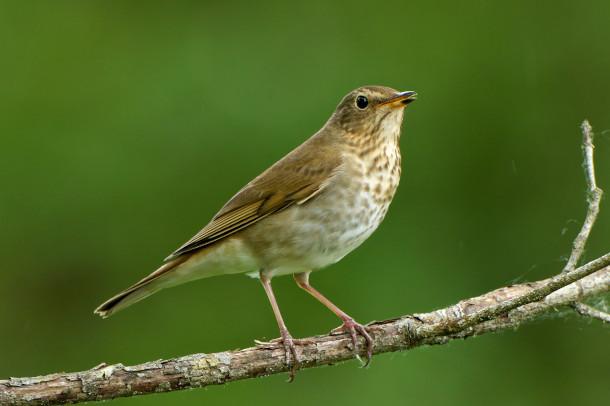
Swainson’s Thrush, also known as the Salmonberry Bird. (Photo: © Gregg Thompson)
CURWOOD: Many geographic features in the United States derive their names from Native American words, think Dakota, Mississippi, and Iowa to name a few. And as BirdNote’s Mary McCann reports, many birds can also trace their names back to an indigenous language.
BirdNote®
Salmonberry Bird
[Song of Swainson's Thrush]
The names of birds can tell stories. We’re hearing the song of the “Salmonberry Bird,” the name indigenous Northwest Coastal people gave to the bird known in English as the Swainson’s Thrush. The Salmonberry Bird’s name comes from its annual arrival in forests across northern regions of the continent, in May, when salmonberries ripen.
The native names of birds sometimes distill the essence of their appearance or behavior. In the Cherokee language, for instance, the Meadowlark is called “star,” because of the way the bird’s tail spreads out when it soars.
[Song of the Western Meadowlark]
The Cherokee name for nuthatch is “deaf,” possibly because of the bird’s disregard for the presence of humans.
[Call of the Red-breasted Nuthatch]
The names of birds in native languages express a long affiliation between people and place. As the writer Nancy Lord observes, “Words have power. Languages connected to place help us respect local knowledge, to ask and answer the tough questions about how the human and the nonhuman can live together in a tolerant and dignified way.”
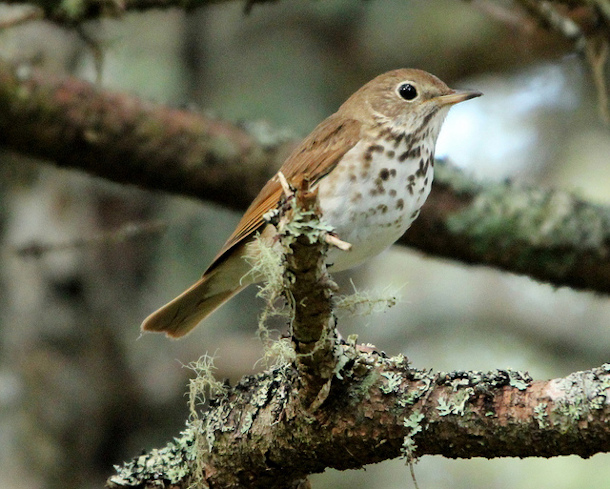
A Swainson’s Thrush perching atop a branch. (Photo: © MB McCLintock)
[Song of the Swainson’s Thrush]
The song of the Salmonberry Bird reminds us of the abiding connection between birds and people and the nourishment nature provides us both.
[Song of the Swainson’s Thrush]
###
Bird sounds provided by The Macaulay Library of Natural Sounds at the Cornell Lab of Ornithology, Ithaca, New York. Song and “quip” call of the Swainson’s Thrush and Red-breasted Nuthatch recorded by G.A. Keller. Western Meadowlark recorded by Gerrit Vyn.
Nancy Lord quote used with permission from Nancy Lord at nancylord@alaskawriters.com
Written by Todd Peterson
Producer: John Kessler
Executive Producer: Chris Peterson
© 2013 Tune In to Nature.org May 2013/2016/2020
ID# 060506SWTHKPLU SWTH-02b
https://www.birdnote.org/show/salmonberry-bird
CURWOOD: For photos make your way to the Living on Earth Website, loe.org
Related link:
Listen to this story on the BirdNote® Website
[MUSIC: Ahn Trio, “Dies Irie” on Lullaby For My Favorite Insomniac, by Kenji Bunch, Sony BMG Music Entertainment]
CURWOOD: Living on Earth is produced by the World Media Foundation. Our crew includes Naomi Arenberg, Bobby Bascomb, Paloma Beltran, Thurston Briscoe, Jenni Doering, Jay Feinstein, Anne Flaherty, Don Lyman, Isaac Merson, Aynsley O’Neill, Jake Rego, Kori Suzuki, and Jolanda Omari. Tom Tiger engineered our show. Alison Lirish Dean composed our themes. Special thanks this week to Destination Wildlife. You can hear us anytime at L-O-E dot org, Apple Podcasts and Google Podcasts, and like us, please, on our Facebook page - Living on Earth. We tweet from @livingonearth. And find us on Instagram at livingonearthradio. I’m Steve Curwood. Thanks for listening!
ANNOUNCER: Funding for Living on Earth comes from you, our listeners, and from the University of Massachusetts, Boston, in association with its School for the Environment, developing the next generation of environmental leaders. And from the Grantham Foundation for the protection of the environment, supporting strategic communications and collaboration in solving the world’s most pressing environmental problems. Support also comes from the Energy Foundation, serving the public interest by helping to build a strong, clean, energy economy.
ANNOUNCER 2: PRX.
Living on Earth wants to hear from you!
Living on Earth
62 Calef Highway, Suite 212
Lee, NH 03861
Telephone: 617-287-4121
E-mail: comments@loe.org
Newsletter [Click here]
Donate to Living on Earth!
Living on Earth is an independent media program and relies entirely on contributions from listeners and institutions supporting public service. Please donate now to preserve an independent environmental voice.
NewsletterLiving on Earth offers a weekly delivery of the show's rundown to your mailbox. Sign up for our newsletter today!
 Sailors For The Sea: Be the change you want to sea.
Sailors For The Sea: Be the change you want to sea.
 The Grantham Foundation for the Protection of the Environment: Committed to protecting and improving the health of the global environment.
The Grantham Foundation for the Protection of the Environment: Committed to protecting and improving the health of the global environment.
 Contribute to Living on Earth and receive, as our gift to you, an archival print of one of Mark Seth Lender's extraordinary wildlife photographs. Follow the link to see Mark's current collection of photographs.
Contribute to Living on Earth and receive, as our gift to you, an archival print of one of Mark Seth Lender's extraordinary wildlife photographs. Follow the link to see Mark's current collection of photographs.
 Buy a signed copy of Mark Seth Lender's book Smeagull the Seagull & support Living on Earth
Buy a signed copy of Mark Seth Lender's book Smeagull the Seagull & support Living on Earth

